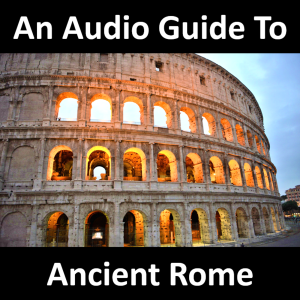
An Audio Guide to Ancient Rome
Society & Culture:Places & Travel

The Pyramid of Cestius was built during the reign of the emperor Augustus, probably between 18 and 12 BCE. It’s surface is white Carrara marble and the tip is exactly 100 Roman feet (30 meters) high.
At the time of its construction, Ancient Rome was heavily influenced by Egyptian architecture after the conquest of Egypt by Augustus in 30BCE. Obelisks and other monuments where being imported from this new province to decorate Rome’s buildings, piazzas and its major sporting venues. Despite this fashion, only two pyramids are known to have been built in Rome and the only one left standing is the Pyramid of Cestius.
Caius Cestius was a tribune, a plebian and member of the religious corporation of the Septemviri Epulonum. The epulones formed one of the four core religious organizations of ancient Roman priests. The Epulones were tasked with arranging feasts and public banquets at festivals and games, duties that had originally belonged to the pontiffs.
In his will, Cestius asked his heirs to construct a tomb in the form of a pyramid and, if that wasn’t an odd challenge enough, he required that the project be completed within 330 days.
On the east and west sides, about halfway up, is the inscription recording the names and titles of Cestius, and below, on the east side only, more text that tells the circumstances of the erection of the monument.
Note that access to the interior of the pyramid is limited to just a couple of days each month and will require you booking tickets in advance that said, it is worth travelling to see this quite remarkable monument even if you don’t go inside.
More Episodes
20: The Curia Julia
 2020-09-20
2020-09-20
 2020-09-20
2020-09-20
19: Black Stone, Rostra and Phocas
 2020-09-20
2020-09-20
 2020-09-20
2020-09-20
18: The Basilica Paulli
 2020-09-20
2020-09-20
 2020-09-20
2020-09-20
25: The Basilica Julia
 2020-09-20
2020-09-20
 2020-09-20
2020-09-20
11: The Temple of Roma and Venus
 2020-09-20
2020-09-20
 2020-09-20
2020-09-20
10: The Arch of Titus
 2020-09-20
2020-09-20
 2020-09-20
2020-09-20
9: The Roman Forum
 2020-09-20
2020-09-20
 2020-09-20
2020-09-20
8: The Baths of Caracalla
 2020-09-20
2020-09-20
 2020-09-20
2020-09-20
7: The Piazza Navona
 2020-09-20
2020-09-20
 2020-09-20
2020-09-20
6: The Arch of Constantine
 2020-09-20
2020-09-20
 2020-09-20
2020-09-20
5: The Ludus Magnus
 2020-09-20
2020-09-20
 2020-09-20
2020-09-20
4: The Capitoline Hill and Insula
 2020-09-20
2020-09-20
 2020-09-20
2020-09-20
2: The Ara Pacis
 2020-09-20
2020-09-20
 2020-09-20
2020-09-20
3: The Colosseum
 2020-09-20
2020-09-20
 2020-09-20
2020-09-20
1: The Pantheon
 2020-09-20
2020-09-20
 2020-09-20
2020-09-20
1: Introduction
 2020-09-19
2020-09-19
 2020-09-19
2020-09-19
0123456789101112131415
Create your
podcast in
minutes
- Full-featured podcast site
- Unlimited storage and bandwidth
- Comprehensive podcast stats
- Distribute to Apple Podcasts, Spotify, and more
- Make money with your podcast
It is Free
- Privacy Policy
- Cookie Policy
- Terms of Use
- Consent Preferences
- Copyright © 2015-2024 Podbean.com





